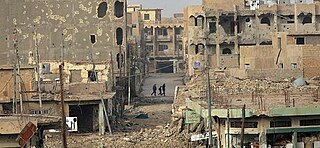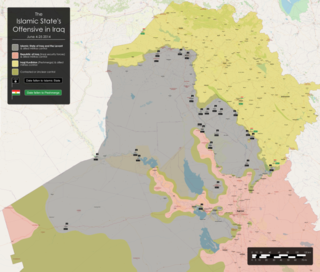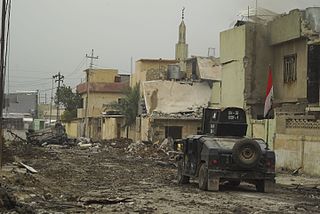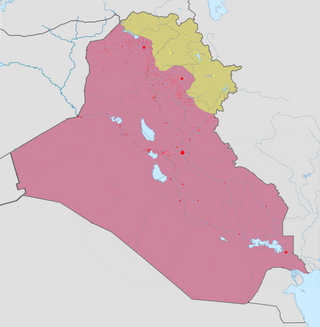Iraqi civil war may refer to:
The Gulf War (1990–1991) was a conflict between Iraq and a U.S.-led coalition, following Iraq's invasion of Kuwait.
The Iraq War began in 2003 and involved a two-phase conflict comprising an initial invasion of Iraq led by U.S. and UK forces and a longer, eight-year phase of occupation and fighting with insurgents.

Ansar al-Islam in Kurdistan, simply called Ansar al-Islam, also nicknamed the Kurdish Taliban, is a Kurdish Islamist militant and separatist group. It was established in northern Iraq around the Kurdistan Region by Kurdish Islamists who were former Taliban and former Al-Qaeda members, which were coming back from Afghanistan in 2001 after the Fall of Kabul. Its motive is to establish an Islamic state around the Kurdistan region and to protect Kurdish people. It imposed strict Sharia in villages it controlled around Byara near the Iranian border. Its ideology follows a traditionalist interpretation of the Quran and Salafism.

An insurgency began in Iraq after the 2003 U.S.-led invasion, and lasted throughout the ensuing Iraq War which lasted from 2003 until 2011. The first phase of the insurgency began shortly after the 2003 invasion and before the establishment of the new Iraqi government. From around 2004 to May 2007, Iraqi insurgents primarily targeted the American-led coalition forces, and later also targeted Iraqi security forces.

The Iraqi civil war was a civil war fought mainly between the Iraqi government along with American-led coalition forces and various sectarian armed groups, mainly Al Qaeda in Iraq and the Mahdi Army, from 2006 to 2008. In February 2006, sectarian tensions in Iraq escalated into a full-scale civil war after the bombing of the Al-Askari Shrine by the Sunni organization Al-Qaeda in Iraq. This set off a wave of reprisals by Shia militants on Sunni civilians, followed by Sunni counterattacks on Shia civilians. In 2006, the Secretary General of the United Nations declared that if patterns of discord and violence continued to prevail, the Iraqi state was in danger of breaking up.

The war on terror, officially the Global War on Terrorism (GWOT), is a global counterterrorism military campaign initiated by the United States following the September 11 attacks and is also the most recent global conflict spanning multiple wars. The main targets of the campaign were militant Islamist and Salafi jihadist armed organisations such as al-Qaeda, the Islamic State, and their international affiliates, which were waging military insurgencies to overthrow governments of various Muslim-majority countries. Other major targets included the Ba'athist regime in Iraq, which was deposed during an invasion in 2003, and various militant factions that fought during the ensuing insurgency.

The Iraqi–Kurdish conflict consists of a series of wars and rebellions by the Kurds against the central authority of Iraq during the 20th century, which began shortly after the defeat of the Ottoman Empire in World War I and lasting until the U.S. invasion of Iraq in 2003. Some put the marking point of the conflict beginning to the attempt by Mahmud Barzanji to establish an independent Kingdom of Kurdistan, while others relate to the conflict as only the post-1961 insurrection by the Barzanis. The conflict lasted until the U.S. invasion of Iraq in 2003, though tensions between the Kurdish autonomy and the central Iraqi government have continued.

The Ahfad al-Rasul Brigades was a Syrian rebel group fighting against the Syrian government in the Syrian Civil War. It was funded by the Qatari government.

The Islamic State of Iraq, previously referred to as al-Qaeda in Iraq, is a militant Salafist jihadist group that aimed to establish an Islamic state in Sunni, Arab-majority areas of Iraq during the Iraq War and later in Syria during the Syrian Civil War.
Iraqi insurgency may refer to:

The Northern Iraq offensive began on 4 June 2014, when the Islamic State began a major offensive from its territory in Syria into Iraq against Iraqi and Kurdish forces, following earlier clashes that had begun in December 2013 involving guerillas.

The War in Iraq was an armed conflict between Iraq and its allies and the Islamic State which began in 2013 and ended in December 2017. Following December 2013, the insurgency escalated into full-scale guerrilla warfare following clashes in the cities of Ramadi and Fallujah in parts of western Iraq, and culminated in the Islamic State offensive into Iraq in June 2014, which lead to the capture of the cities of Mosul, Tikrit and other cities in western and northern Iraq by the Islamic State. Between 4–9 June 2014, the city of Mosul was attacked and later fell; following this, Prime Minister Nuri al-Maliki called for a national state of emergency on 10 June. However, despite the security crisis, Iraq's parliament did not allow Maliki to declare a state of emergency; many legislators boycotted the session because they opposed expanding the prime minister's powers. Ali Ghaidan, a former military commander in Mosul, accused al-Maliki of being the one who issued the order to withdraw from the city of Mosul. At its height, ISIL held 56,000 square kilometers of Iraqi territory, containing 4.5 million citizens.

The departure of US troops from Iraq in 2011 ended the period of occupation that had begun with the U.S.-led invasion in March 2003. The time since U.S. withdrawal has been marked by a renewed Iraqi insurgency and by a spillover of the Syrian civil war into Iraq. By 2013, the insurgency escalated into a renewed war, the central government of Iraq being opposed by ISIL and various factions, primarily radical Sunni forces during the early phase of the conflict. The war ended in 2017 with an Iraqi government and allied victory, however ISIL continues a low-intensity insurgency in remote parts of the country.
Collaboration with the Islamic State refers to the cooperation and assistance given by governments, non-state actors, and private individuals to the Islamic State (IS) during the Syrian Civil War, Iraqi Civil War, and Libyan Civil War.
Terrorism in Turkey is a significant issue for Turkish authorities as 1.6 million people were investigated after being accused of terrorism between 2016 and 2020. Prominent figures of the Turkish opposition were accused of an alleged membership of a terrorist group. The definition of terrorism in Turkey is rather vague as it also includes a social media post or taking part in popular protests. Terrorist attacks in Turkey have occurred in the southeastern and eastern provinces, and major cities like Ankara and Istanbul. The group Dev-Genç was founded in 1969 and involved in a string of kidnappings, bombings and bank robberies until martial law was declared in 1971. While these incidents were halted by 1973, attacks by the Armenian groups Armenian Secret Army for the Liberation of Armenia (ASALA) and Justice Commandos of the Armenian Genocide (JCAG) continued. Most of these attacks took place internationally, though there were some attacks within Turkey as well. For example, the May 1977 bombing of the Istanbul airport and the Ankara Esenboğa Airport attack. In Turkey protesting for Kurdish rights or supporting or demanding education in the Kurdish language is often also seen as supporting terrorism of the Kurdistan Workers' Party (PKK).

The Iraqi conflict is an ongoing armed conflict that began with the 2003 invasion of Iraq by a United States-led coalition that toppled the government of Saddam Hussein. The conflict continued as an insurgency emerged to oppose the occupying forces and the post-invasion Iraqi government. The United States officially withdrew from the country in 2011 but became reinvolved in 2014 at the head of a new coalition to fight ISIS. The main phase of the conflict ended following the defeat of the Islamic State in the country in 2017, but a low-level insurgency is ongoing in the rural north parts of the country.
The group that became The Islamic State was founded in 1999 by Jordanian Salafi jihadist Abu Musab al-Zarqawi under the name Jamāʻat al-Tawḥīd wa-al-Jihād. A document captured in 2004, thought to indicate the group's strategy and modus operandi, urges Al-Qaeda to help al-Zarqawi start a "sectarian war" against Shia in Iraq to rally Sunni Arabs to its side.